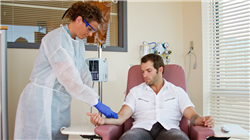University certificate
Scientific endorser

The world's largest faculty of nursing”
Introduction to the Program
A comprehensive and 100% online program, exclusive to TECH, with an international perspective backed by our membership in the National League for Nursing"

Oncology Nursing is essential to ensure that cancer patients receive proper, safe, and emotionally supported care, significantly contributing to the healing process or disease management. For these reasons, education and training in this area are essential, not only to improve cancer treatment outcomes but also to provide comprehensive emotional and physical support, which helps the patient adapt to their new reality.
To meet this demand, TECH has designed this Advanced master’s degree in Oncology Nursing, offering the most comprehensive and up-to-date content in the field. Through an integrated and dynamic approach, the university program will cover fundamental aspects such as oncology pharmacology, palliative care, management of side effects, and collaboration with other healthcare professionals. Additionally, it will include content on the emotional management of patients, their family environment, and interdisciplinary coordination to provide more human-centered care. As a result, professionals will receive high-quality training aligned with the best international practices.
Thanks to the 100% online format, students can adapt the program to their schedules and needs, accessing the content at any time and from anywhere. Moreover, the Relearning methodology implemented will reinforce learning by repeating and assimilating essential concepts, facilitating long-term comprehension and knowledge retention.
As a member of the National League for Nursing (NLN), TECH offers students access to assessment tools, digital libraries, webinars, and conferences focused on nursing educational excellence. This membership promotes faculty development, engagement with leading experts in the field, and the opportunity to join high-impact academic and clinical networks.
Make oncology care your career! You will acquire the most advanced knowledge in Oncology Nursing with the most comprehensive and up-to-date Advanced master’s degreeon the market”
This Advanced master’s degree in Oncology Nursing contains the most complete and up-to-date scientific program on the market. The most important features include:
- The development of practical cases presented by experts in Nursing
- The graphic, schematic, and practical contents with which they are created, provide scientific and practical information on the disciplines that are essential for professional practice
- Practical exercises where the self-assessment process can be carried out to improve learning
- Special emphasis on innovative methodologies in Oncology Nursing
- Theoretical lessons, questions to the expert, debate forums on controversial topics, and individual reflection assignments
- Content that is accessible from any fixed or portable device with an Internet connection
Make a real difference in the lives of patients with cancer! In this university program, you will receive cutting-edge training on palliative care, pain management, and oncology treatments”
The teaching staff includes nursing professionals who bring their experience to this training program, as well as renowned specialists from leading societies and prestigious universities.
The multimedia content, developed with the latest educational technology, will provide the professional with situated and contextual learning, i.e., a simulated environment that will provide an immersive learning experience designed to prepare for real-life situations.
This program is designed around Problem-Based Learning, whereby the student must try to solve the different professional practice situations that arise throughout the program. For this purpose, the professional will be assisted by an innovative interactive video system created by renowned and experienced experts.
Ready to specialize in one of the most in-demand areas of healthcare? In this university program, you will be trained by experienced instructors and gain access to a fully updated syllabus"

Turn your passion for health into a specialized career in oncology. You will benefit from both practical and theoretical training that will propel the growth of your professional career!"
Why study at TECH?
TECH is the world’s largest online university. With an impressive catalog of more than 14,000 university programs available in 11 languages, it is positioned as a leader in employability, with a 99% job placement rate. In addition, it relies on an enormous faculty of more than 6,000 professors of the highest international renown.

Study at the world's largest online university and guarantee your professional success. The future starts at TECH”
The world’s best online university according to FORBES
The prestigious Forbes magazine, specialized in business and finance, has highlighted TECH as “the world's best online university” This is what they have recently stated in an article in their digital edition in which they echo the success story of this institution, “thanks to the academic offer it provides, the selection of its teaching staff, and an innovative learning method aimed at educating the professionals of the future”
A revolutionary study method, a cutting-edge faculty and a practical focus: the key to TECH's success.
The most complete study plans on the university scene
TECH offers the most complete study plans on the university scene, with syllabuses that cover fundamental concepts and, at the same time, the main scientific advances in their specific scientific areas. In addition, these programs are continuously being updated to guarantee students the academic vanguard and the most in-demand professional skills. In this way, the university's qualifications provide its graduates with a significant advantage to propel their careers to success.
TECH offers the most comprehensive and intensive study plans on the current university scene.
A world-class teaching staff
TECH's teaching staff is made up of more than 6,000 professors with the highest international recognition. Professors, researchers and top executives of multinational companies, including Isaiah Covington, performance coach of the Boston Celtics; Magda Romanska, principal investigator at Harvard MetaLAB; Ignacio Wistumba, chairman of the department of translational molecular pathology at MD Anderson Cancer Center; and D.W. Pine, creative director of TIME magazine, among others.
Internationally renowned experts, specialized in different branches of Health, Technology, Communication and Business, form part of the TECH faculty.
A unique learning method
TECH is the first university to use Relearning in all its programs. It is the best online learning methodology, accredited with international teaching quality certifications, provided by prestigious educational agencies. In addition, this disruptive educational model is complemented with the “Case Method”, thereby setting up a unique online teaching strategy. Innovative teaching resources are also implemented, including detailed videos, infographics and interactive summaries.
TECH combines Relearning and the Case Method in all its university programs to guarantee excellent theoretical and practical learning, studying whenever and wherever you want.
The world's largest online university
TECH is the world’s largest online university. We are the largest educational institution, with the best and widest online educational catalog, one hundred percent online and covering the vast majority of areas of knowledge. We offer a large selection of our own degrees and accredited online undergraduate and postgraduate degrees. In total, more than 14,000 university degrees, in eleven different languages, make us the largest educational largest in the world.
TECH has the world's most extensive catalog of academic and official programs, available in more than 11 languages.
Google Premier Partner
The American technology giant has awarded TECH the Google Google Premier Partner badge. This award, which is only available to 3% of the world's companies, highlights the efficient, flexible and tailored experience that this university provides to students. The recognition as a Google Premier Partner not only accredits the maximum rigor, performance and investment in TECH's digital infrastructures, but also places this university as one of the world's leading technology companies.
Google has positioned TECH in the top 3% of the world's most important technology companies by awarding it its Google Premier Partner badge.
The official online university of the NBA
TECH is the official online university of the NBA. Thanks to our agreement with the biggest league in basketball, we offer our students exclusive university programs, as well as a wide variety of educational resources focused on the business of the league and other areas of the sports industry. Each program is made up of a uniquely designed syllabus and features exceptional guest hosts: professionals with a distinguished sports background who will offer their expertise on the most relevant topics.
TECH has been selected by the NBA, the world's top basketball league, as its official online university.
The top-rated university by its students
Students have positioned TECH as the world's top-rated university on the main review websites, with a highest rating of 4.9 out of 5, obtained from more than 1,000 reviews. These results consolidate TECH as the benchmark university institution at an international level, reflecting the excellence and positive impact of its educational model.” reflecting the excellence and positive impact of its educational model.”
TECH is the world’s top-rated university by its students.
Leaders in employability
TECH has managed to become the leading university in employability. 99% of its students obtain jobs in the academic field they have studied, within one year of completing any of the university's programs. A similar number achieve immediate career enhancement. All this thanks to a study methodology that bases its effectiveness on the acquisition of practical skills, which are absolutely necessary for professional development.
99% of TECH graduates find a job within a year of completing their studies.
Advanced Master's Degree in Oncology Nursing
The diagnosis, prevention, and treatment of neoplasms, especially malignant tumors related to cancer, are some of the greatest challenges faced in the clinical field. Given their multiple varieties, symptoms, and conditions, it is necessary for healthcare professionals to update their knowledge in order to incorporate the most innovative tools into their daily practice to successfully address this pathology. The Advanced Master's Degree in Oncology Nursing developed by TECH Global University is the opportunity you’ve been waiting for to complement your studies with a series of highly useful insights. In this online program, you will find all the theoretical and practical resources to enhance your skills through the highest clinical standards. Through the proposed thematic modules, you will learn aspects such as oncological procedures based on the type of tumor (benign or malignant), the role of nursing in administering chemotherapy, types of tumors and oncological treatments, nutritional parameters, and the psychosocial approach to oncology patients. Similarly, you will deepen your understanding of care based on diagnoses (NANDA), objectives (NOC), and interventions (NIC). Finally, you will explore the most innovative diagnostic techniques and methods employed in oncology nursing. These and other concepts will be learned over the course of two years.
Specialize in Oncology Care
The appearance of a neoplasm, especially if it is malignant, completely changes a person’s life, requiring proper care to improve their diagnosis. That is why, at the Faculty of Nursing at TECH, with a global presence, we offer you the best teaching materials based on real clinical cases. This will make your learning immersive and fully organic. Our program stands out for containing the best methodology, complemented by cutting-edge educational equipment. Here, you will learn the global assessment of oncology patients, radiation therapy modalities, the Nursing Care Process (NCP), and palliative care. Additionally, you will delve into the management of oncological emergencies, clinical trials, and new therapies used for cancer treatment. By acquiring this knowledge, you will master the key techniques to effectively care for patients, implementing hormonal, biological, and interventional treatment plans.







